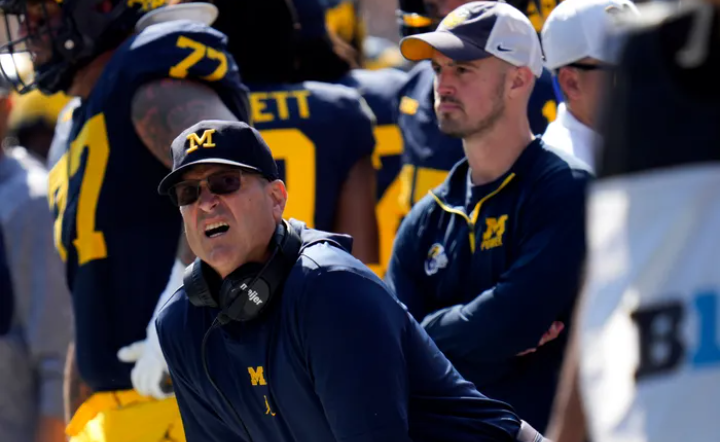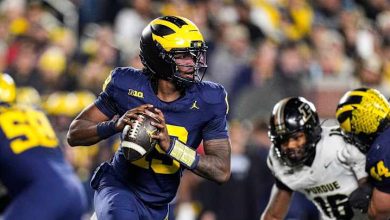Cheating in sports: Michigan football the latest scandal. Why is playing by rules so hard?

There was no reason any sports fan should have known the name Connor Stalions. Trim, goateed and often seen wearing a poorly fitted hat, he looked no different than any of a dozen coaching wannabes the public watches each Saturday — yet mostly ignores — on every college football sideline in America.
He was a small cog in the vast machine of Michigan football, a program that prides itself on having been the first and only in the history of the sport to win 1,000 games since playing its first in 1879.
But this fall, at a place defined by famous names like Fielding Yost, Bo Schembechler, Desmond Howard, Tom Brady and even President Gerald Ford, there was a simple reason to explain why Stalions — at least for a few weeks — became bigger than all of them in the realm of college football.
He cheated.
As long as there have been games organized by an agreed-upon set of rules, there have been people willing to break them to reap whatever comes with victory — money, fame, or in Stalions’ case, the relentless pursuit of career advancement through illicit means. The evidence of it stretches back centuries and continues to fascinate fans, athletes and scholars.
“Cheating in the chariot races was written about in the Iliad,” said Clark Power, a professor of psychology and education at the University of Notre Dame who also directs a non-profit organization that promotes equity and character development in youth sports. “It’s a human-nature problem, in some sense.”
What compels people to cheat in the first place? What about those gray areas of gamesmanship that might not be considered explicit cheating but don’t comport with the spirit of the rules? And is truly fair competition possible when so many people are willing to cheat?
“Whatever is inside of you and me, the intensity and challenge of sports will bring it out,” said John White, a professor of practical theology who created the Faith & Sports Institute at Baylor University. “Is it bringing out the best version of me or the worst version?”
The revelation that Stalions, an analyst working on a $55,000 per year salary, had created a network of amateur spies to film the sidelines of future Michigan opponents in an elaborate scheme to decode their play calls, rocked the sport this fall.
It sparked an investigation from the NCAA, which prohibits in-person scouting. It cost Stalions his job, as well as Michigan linebackers coach Chris Partridge, who allegedly tried to tamper with evidence once the revelations became public. It forced the Big Ten to suspend head coach Jim Harbaugh for three games, even though there was no evidence Harbaugh sanctioned or even knew of the scheme.
It also, predictably, sparked a backlash from fans who questioned whether Stalions, a former Marine Corps captain, had actually cheated or merely exposed a loophole in NCAA rules. Coaches from across the country weighed in, generally agreeing that while Stalions had crossed a line, sign-stealing and information-sharing between teams had long been part of the sport. And in a 10-page letter to the Big Ten warning against punishment without a lengthy investigation, Michigan’s athletics director argued that the specific rule Stalions broke against in-person scouting offered minimal competitive advantage and that its value had recently been debated by an NCAA committee.
Though the fallout is still ongoing as Michigan prepares to play in a College Football Playoff semifinal Jan. 1, the scandal has followed a familiar cycle of cynicism repeated hundreds of times throughout the history of sports when evidence of cheating is brought to light: Initial outrage, followed by the rationalization that everyone’s stretching the rules to some degree, followed by a debate over why the rule exists in the first place.
Cheating in baseball: Coming to terms with PED use a quarter-century later
Even today, more than 25 years after baseball’s steroid-fueled home run chases that forced a rewrite of the record books, there is an ongoing conversation about how the sport should recognize the achievements of players who either admitted to or were suspected of using performance-enhancing drugs, leaving voters the near-impossible job of litigating asterisks next to records like Barry Bonds’ 73 home runs in 2001.
Though prominent names who were linked to PEDs like Bonds, Mark McGwire, Sammy Sosa and Roger Clemens have been denied entry to the Hall of Fame, is that fair? Does it even make sense, given that the Hall undoubtedly includes steroid users who were never caught?
There have even been academic and scientific movements over the years advocating to make PEDs legal in a regulated environment. In a 2004 article published in the British Journal of Sports Medicine, Oxford bioethicist Julian Savulescu and his two co-authors argued that, in fact, a permissive approach to PEDs would actually do more to level the playing field because it would make sports less of a genetic lottery.
“Our crusade against drugs in sport has failed,” they wrote. “Performance enhancement is not against the spirit of sport; it is the spirit of sport. To choose to be better is to be human. Athletes should be given this choice.”
The root of that argument is that catching drug users is so difficult and policed so unevenly that it’s no longer even worth trying. But that same logic could be applied to every sport and every form of cheating, which is in large part what makes it so pervasive: The reward is often greater than the risk of being exposed.
It’s a conundrum perhaps best summed up by the former NASCAR driver Darrell Waltrip, who once famously said: “If you don’t cheat, you look like an idiot; if you cheat and don’t get caught, you look like a hero; if you cheat and get caught, you look like a dope.”
The compulsion to cheat manifests in countless ways, from college coaches breaking NCAA recruiting rules to further their careers to golfers nudging their ball out of a difficult lie when they think nobody’s watching, to competitive fishermen stuffing their catches with lead weights and fish fillets — an incident that two men actually spent 10 days in jail for earlier this year after being caught.
Some of it is premeditated and carefully executed over a long period of time. Some of it, like a college tennis player erroneously calling a ball out on a big point, happens so quickly and spontaneously that their moral compass may not even be fully engaged.
But regardless of its nature or purpose, cheating is such an ubiquitous part of sports that we sometimes take for granted just how corrosive it is to the very ideal of what athletic competition is supposed to represent.
“This is the great irony of it,” Power said. “When you ask people if they think sports build character, just about everyone I’ve talked to in my whole life will say yes. On the other hand, just about every sport has its forms of cheating, and there seems to be some evidence that it gets worse from year to year. There is a moral illness we mistake for normalcy, but I think a lot of us want to believe in fair competition.”
Cheating has become reflective of our changing culture
Cheating is such an extensive part of everyday life, manifesting in so many forms, that we often don’t give it a second thought. People cheat on their taxes, they cheat on their spouses, they falsify résumés when applying for jobs, they plagiarize academic work and misrepresent themselves in online dating profiles. All of these things have a corrosive effect on our culture because there is usually a clear cause-and-effect between one party cheating and another being harmed in very real ways.
But as society has become more permissive in many ways, even high-profile cheating often gets overlooked or excused. Issues that might have been disqualifying for, say, a presidential candidate 40 years ago are now largely dismissed as unimportant or even celebrated.
Cheating in sports, however, seems to inspire a much different reaction on both sides. Because we all fundamentally understand that any sporting event will result in a winner and a loser, those who are outed as cheaters usually become pariahs. And yet, because the stakes in sports are inherently lower than in many other aspects of life, it seemingly becomes much easier for many people to rationalize breaking rules in pursuit of victory.
“Sports are different because people just think the rules are arbitrary, and of course they are because we just kind of made them up,” said Shawn Klein, an associate teaching professor of philosophy at Arizona State whose research focus includes sports ethics. “Why is it 90 feet to first base? Why is it three strikes instead of four? I don’t know. They landed on it, and it works. So what’s the big deal? It’s just a game. There’s an element that people who would never cheat on their taxes or walk out of the store with an item who might cheat in sports because they think it’s not a big deal.”
But according to several sports ethicists, that mindset overlooks one key difference: While our common rules and norms have been implemented as a way to organize society and improve quality of life, they don’t actually create society. Sports, by contrast, wouldn’t exist without the rules.
“The point isn’t to get the white ball in the hole with a stick,” Klein said. “It’s doing it given the constraints you’ve all agreed to, which is what creates the game. By going outside that, you’re not playing the game anymore in some way. So the process is maybe more important in sports than in other parts of our lives. What we actually care about is the doing of the thing, not just that we get there first.”
But the reality is that getting there first — or with the most points, runs or goals — is the end game for many of those who play or coach sports at the highest level.
A famous study that began in the 1980s called.,





